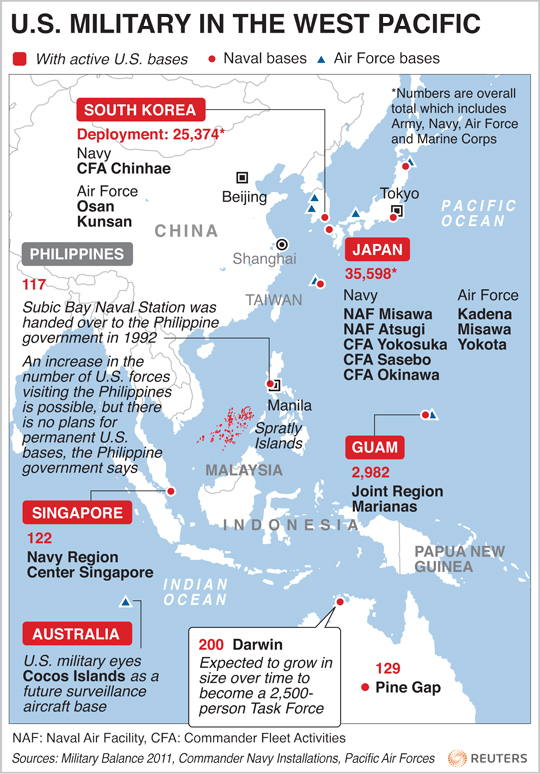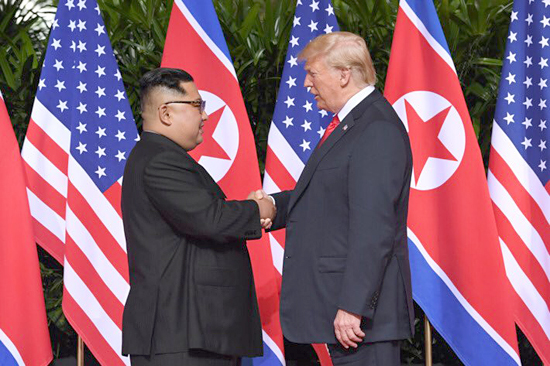The village idiots of Imperial Washington are having conniption fits about the Singapore summit. That’s because after 65 years of lobbing military threats and diplomatic poison pens at Pyongyang, the Donald showed the way to resolving the North Korean file in just six hours.
That is, in the case of the Korean peninsula like the rest of the world, it is Washington’s job to safeguard the American homeland, not to pass judgment on the merits and morality of foreign leaders and regimes.
That’s the essence of the Donald’s triumph in Singapore.
By not listening to the Washington poobahs of failure and perpetual war, Trump ended in one grand photo op the senseless demonization, isolation and ostracization of a regime that has maintained its brutal rule owing to one overriding factor: Namely, the omnipresent hostility implicit in the US military occupation of the peninsula’s south and the lethal armadas it maintains in the seas and airspace all around it.

The encirclement of North Korea by Washington’s war machine was never remotely justified, however, because the former did not and does not present a threat to the American homeland. How could it with a per capita income of barely $1,200 and a minuscule, impoverished, technologically-stillborn economy whose annual production amounts to 12 hours of US GDP?
Yes, in recent years North Korea has embarked on a quest for nuclear weapons. But its understandable need for deterrence should be evident to any simpleton not schooled in the hypocrisy of Imperial Washington.
To wit, its ruling family did not wish to become another experiment in "regime change" and thereby end up hanging from an American gallows like Saddam or being dragged from the back of a Jeep and brutalized and sodomized like Khadafy.
And that’s why the Kim regime was going for ICBMs and nukes. Full stop.
In fact, the two pictures below tell you all you need to know. Perhaps somewhere in the deep clutter of his purportedly uninformed mind, the Donald recalled that Nixon took tea with Mao in Beijing and Ronald Reagan visited Gorbachev at the Kremlin.
So Trump resolved to fly to Singapore to see if he could talk sense to the Little Rocket Man. And at least judging by the Korean press on both sides of the DMZ, he came, he spoke and he did.

Indeed, the heartening breakthrough on Tuesday was a much needed reminder of why our vote for the Donald in November 2016 wasn’t entirely wasted after all.
Admittedly, the image below is not pleasant to see. But it’s surely a facsimile of what Imperial Washington had in store for Kim Jong-un had the Great Disrupter not landed in the Oval Office.
When Hillary Clinton infamously said about Khadafy that "we came, we saw, he died", she apparently omitted the "savagely" part.
Then again, Washington’s own special brand of terror mainly produces pushback from the regimes its targets and blowback from the peoples it bombs, drones and incinerates – not enhanced safety and security for the citizens of Lincoln NE and Springfield MA.

To be sure, the Singapore Summit was only an epochal reset of relations, not a treaty to de-nuclearize, de-militarize and delegate the future of the Korean peninsula to the Koreans.
But that will come – in the fits and starts of diplomacy and via the Donald’s special art-of-the-deal modus operandi.
That’s because Kim would like 50 years of prosperous rule; America is tired of war and the debilitating costs of Empire; and the Donald desperately wants to grasp the mantle of peacemaker and prove his rabid mainstream critics wrong.
More importantly, it will happen because the entire narrative of Imperial Washington and its stenographers in the MSM – the meme that denuclearization is bafflingly complex and that the North Koreans have persistently cheated upon and subverted past deals – is a tissue of lies and misdirection.
In particular, the failure of the so-called Agreed Framework negotiated by the Clinton Administration in 1994 has been continuously waved like a bloody flag by the Imperial City’s hawks and neocons. Yet the real history overwhelming proves that it was Washington, not Pyongyang, which reneged.
The purpose of the 1994 deal was to terminate North Korea’s plutonium route to a nuclear bomb. According to US intelligence at the time, Pyongyang otherwise would have had enough nuclear material to build upwards of 75 bombs by the beginning of the next decade.
The Agreed Framework was designed to end that threat by having North Korea dismantle its two plutonium facilities in return for four things:
- Two light-water reactors in North Korea by 2003 that a US-led consortium would build in order to compensate for the loss of plutonium based power;
- In the interim, the US would supply the north with 500,000 tons per year of heavy fuel oil;
- The US economic sanctions would be lifted and North Korea would be removed from Washington’s list of state sponsors of terrorism, and also the political relationship, which was still subject to the 1953 armistice, would be normalized via a formal peace treaty; and
- Both sides would provide “formal assurances” against the threat or use of nuclear weapons.
Initially, developments unfolded according to the Framework and by 1998 US officials involved in the implementation testified to Congress that both Washington and the International Atomic Energy Agency (IAEA) were satisfied that there had been “no fundamental violation of any aspect of the Framework Agreement” by North Korea.
For all practical purposes, North Korea’s plutonium facilities became unusable and un-restorable.
To the contrary, what didn’t happen was much of Washington’s end of the bargain.
Most importantly, the light-water reactors were never built because the US consortium tasked with constructing them was in severe debt; and because the whole project became a partisan football on Capitol Hill, which blocked the necessary funding.
Likewise, the heavy fuel oil shipments were often delayed or missed, and North Korea was not removed from the list of state sponsors of terror until 2008, even though it had long met the criteria for removal.
At the same time, a limited number of sanctions were eased, but not until 2000. That was six years later than pledged in the Agreed Framework and the delay was owing to continuous political attacks on the deal from hawkish quarters on Capitol Hill – especially from partisan Republicans accusing the Clinton Administration of selling out to America’s purported enemies.
Finally, no action was ever taken to formally end the Korean War and "formal assurances" that the US would not attack North Korea were only provided years after they were to have been made.
In short, throughout the 1990s Congressional politicians and their Deep State allies played the North Korea card against the Clinton White House, thereby strangling the 1994 deal in a twilight zone of inconsistency, failed deliverables and bad faith.
Even then, South Korea persisted and its government formally launched an opening to the north called the Sunshine Policy in the late 1990s.
But as explained below that too came under unremitting attack by the neocons in the Bush Administration; and when the Pyongyang regime was foolishly identified as a link in the "axis of evil" in Bush’s 2002 State of the Union address, it was all over except the shouting.
The truth is, Washington had no reason to be on the Korean peninsula or to threaten the Kim regime with devastating military force in the first place; and most especially not after the cold war ended in 1991 and the purported "dominoes" of communist world conquest had slithered off the pages of history.
The so-called North Korean reneging since 1991, in fact, has simply been the product of rearguard action by the unrepentant hawks, neocons and military/industrial complex supplicants who dominate the Washington policy machinery.
They made it their purpose to insure that the Empire would never vacate the Korean peninsula, thereby also insuring that denuclearization and normalization among the Korean peoples would never happen and that the US Warfare State would never go wanting for enemies and funding.
However, you would never know this from listening to the infinitely lazy, uninformed and group think addled chatter of the mainstream media. Still, the realized truth of modern history is crystal clear.
To wit, going all the way back to the beginning, Washington had no business intervening in a quarrel between two no-count wanna be dictators (Syngman Rhee and Kim il Sung) on the Korean peninsula in June 1950; and surely has no business still stationing 29,000 American soldiers there 68 years latter.
For sure, it was never about strategic real estate. After 40 years of brutal and predatory Japanese occupation, postwar Korea was an economic backwater with the GDP of perhaps Cleveland, Ohio, and had been temporarily divided at the 38th parallel by Truman and Stalin as an afterthought at Potsdam (July 1945).
Far from any intent to create separate nations on a peninsula that had been ethnically and politically unified for centuries, the line only marked a convenient staging grounds for the impending final attack on Japan that Stalin had committed to aid. In fact, Washington’s suave original cold warrior, Dean Acheson, had described the Potsdam demarcation as a mere "surveyors line".
But as US/Soviet tensions heated up in the late 1940’s, the U.S. occupation forces in the south encouraged the puppet government they had established under ex-pat and Washington dandy, Syngman Rhee, to cleanse the country of left-wing influences and to prepare to eventually rule the entire peninsula.
So when hostilities broke out between the two Korean sides in June 1950, Washington instantly transformed it into a proxy war against the Soviet Union and its fledgling ally in China, which had just fallen under Mao’s control the previous year.
What we know today, of course, and what staunch non-interventionists like Senator Robert Taft and Congressman Howard Buffett (R-Nebraska and Warren’s father) knew even then, is that 1950s style communism could take care of its own self-destruction.
America only needed to militarily secure the homeland, and then wait out the eventual demise of the wretched states that had temporarily fallen victim to communist misrule.
That is to say, a vastly different foreign policy would have emerged if it had been rooted in an understanding of the inherent superiority of free market capitalism and the inexorable certainty that centralized socialism would fail.
Such a policy would never have been duped into the folly of a proxy war on this economically and strategically irrelevant Asian littoral.
As it happened, the Soviet Union did destroy itself from within in a matter of decades. And just in the nick of time, Mr. Deng discovered that Mao had nearly destroyed China on the false belief that it could be collectivized from the barrel of a gun.
Instead, Deng not only rescued Mao’s calamity by turning from firing squads to a hyperactive printing press, but spawned the greatest Ponzi scheme of borrowing, building, speculation and malinvestment in human history.
It is surely a false and unsustainable prosperity, but for the moment it rings out a great irony.
Rather than a threat to America’s security, Mr. Deng’s great Red Ponzi is considered by Wall Street to be the very engine of "growth" in the modern world and the suzerains of Beijing the very model of unfailing prosperity management and economic "stimulus" if, as and when needed.
That begs the question, of course, as to what would have happened when the Chinese army poured across the Yalu River in November 1950 if it had not been impeded by American GIs.
After all, had Korea ended up as #8 among China’s "autonomous and special" administrative units exactly why would that imperil the safety and security of the American homeland any more today than does the current Chinese rule over Guangxi, Inner Mongolia, Tibet, Ningxia, Xinjiang or even Hong Kong and Macau?
So if there would be no threat now, why then? Why ever?
The fact is, the seven decade confrontation on the 38th parallel is an artifact of empire, not a necessity of homeland security. It is the handiwork of a Warfare State served by a permanent political class that derives its power, purpose and resources from the faithful pursuit and stewardship of an American Imperium.
Imperial Washington, like Rome, needs purportedly imperiled frontiers to justify its rule and heavy draft of military and economic resources.
Indeed, after 1960 when the tyrannical Syngman Rhee was driven from office by his own people, there were numerous times that Washington could have evacuated the peninsula, but one imperial project after another prevented the return of the Korean peninsula to the Koreans to settle their differences as they saw fit.
In the 1960s and early 1970s it was the folly of the Vietnam invasion that kept the fear of falling "dominoes" alive in the Imperial City and American forces bivouacked on the 38th parallel in order to keep the two Koreas divided.
Likewise, during the 1980s the giant and unnecessary Reagan defense buildup was predicated on the myth of a globally resurgent "Evil Empire" in Moscow, meaning that the South Korean frontier required military reinforcement, not the rational course of abandonment.
Indeed, we recall well that the predicate for the massive squandering of resources in the Reagan defense buildup was that America needed the capacity to fight two-and-one-half wars simultaneously – the "half" war part being on the Korean peninsula.
Yes, China had just been enfeebled by Mao’s famines and the madness of the cultural revolution and the Soviet economy was lapsing into the entropic decay of over-centralization and militarization. So the two-and-one-half war fighters never did say who it was that would occupy the Korean peninsula other than some variant of the Korean people.
Then came the demise of the Soviet Union in 1991 and Mr. Deng’s massive shift to export-mercantilism a few years later to save China from an economic and civil collapse that would have ended the rule of the communist party. At that point, there was zero chance of a renewed proxy war.
So surely that was the very time to bring 29,000 American servicemen and women home, thereby enabling the former Hermit Kingdom to work out a 21st century arrangement for either the reunification of all Koreans or at least their coexistence in autonomous zones of self-governance.
But that didn’t happen, either. And the reason is not hard to resurrect from the history of the 1990s.
Bill and Hillary were far more intent on gaining a second term in the White House than in carrying out the assigned mandate of their 1960s generation. That is, to dismantle the American Empire and bring the possibility of general peace to the world for the first time since August 1914.
So they temporized and equivocated and chickened out when the Agreed Framework was attacked by the GOP, thereby precluding a readily available peace settlement in Korea.
After that chance was blown, the South Koreans themselves attempted to normalize the peninsula and pave the way for an end to the American occupation.
As indicated above, between 1998 and 2006 they diligently pursued what they called the "sunshine policy". And it did begin to thaw the tensions between north and south for the first time in 50 years – including humanitarian aid from the south, family reunifications and the beginnings of cross-DMZ flows of trade and investment.
At length, the policy failed, but there should be no confusion as to why. The bloodthirsty neocons of the George W. Bush administration killed it in the cradle by naming North Korea to the axis of evil, when, in fact, it was an accident of history long past its sell-by date.
Rarely has there been a stupider act of foreign policy than the hideous refrain inserted into Bush’s 2002 State of the Union address by a speechwriting twit named David Frum, who apparently invented the "axis of evil" from wholecloth.
So if anything, the bellicose hostility from Pyongyang since then is as much the responsibility of Frum and his fellow neocon belligerents as anything else.
Still, after all those blown chances to roll back what is really an illicit forward frontier of Imperial Washington, there is still no reason for any American presence at all on the Korean peninsula.
And that’s to say nothing of the massive 350,000 soldier war game rehearsals for an invasion of North Korea that are staged annually by US and South Korean forces.
And that gets us to the bottom line. To wit, as impetuous, egomaniacal and uninformed as he may be – even Donald Trump could see the pointlessness of America’s imperial misadventure in Korea.
And so he has frozen these insanely provocative war games in return for Kim Jong-un’s commitment to freeze any further testing of ICBMs and nuclear bombs, and to continue down a path that may eventually rid this hapless peninsula of both the nukes and the yanks.
For that alone the Donald’s election (but hopefully not re-election) will prove to have been worth the price.
Indeed, if Trump can implement a final deal with Kim Jong-un after 65 years of unrelenting cold war, that which the peace of the world and the solvency of America really require – Peace with Putin – would be a piece of cake.
David Stockman was a two-term Congressman from Michigan. He was also the Director of the Office of Management and Budget under President Ronald Reagan. After leaving the White House, Stockman had a 20-year career on Wall Street. He’s the author of three books, The Triumph of Politics: Why the Reagan Revolution Failed, The Great Deformation: The Corruption of Capitalism in America and TRUMPED! A Nation on the Brink of Ruin… And How to Bring It Back. He also is founder of David Stockman’s Contra Corner and David Stockman’s Bubble Finance Trader.


